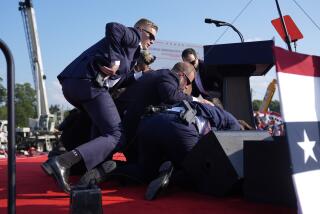Chile Scraps State Dinner Over Tussle With U.S. Secret Service
- Share via
SANTIAGO, Chile — When President Bush and his Chilean counterpart, Ricardo Lagos, met this weekend at the Asia-Pacific Economic Cooperation summit, they saw eye-to-eye on free trade, monetary policy and the need to fight terrorism. But their two governments couldn’t agree on one key issue: dinner.
Bush and First Lady Laura Bush were to attend an elaborate state dinner Sunday at the La Moneda presidential palace here with Lagos and more than 200 dignitaries, including the heads of Chile’s police and armed forces.
But Chilean officials called off the dinner at the last minute amid a disagreement between the U.S. Secret Service and Chile’s elite carabinero presidential guard over security measures.
White House officials referred questions about the dispute to the Chileans.
“They’re the host government. If you have questions, you should talk to them,” White House Press Secretary Scott McClellan said.
But a high-ranking Chilean diplomat told Santiago’s El Mercurio newspaper that Lagos had objected to the Americans’ insistence that all the attendees pass through metal detectors.
“President Lagos considered it unacceptable that the highest-ranking officials in the country and distinguished men of business would be submitted to a search that can be humiliating,” the source said.
It was the second tiff over security between Chilean and American officials in two days. On Saturday, Bush intervened when a carabinero stopped one of his Secret Service agents from accompanying him to a dinner honoring the 21 leaders attending the summit.
As a scuffle ensued, Bush reached out for his lead agent, Nick Trotta, to pull him inside. Trotta was released. The president appeared annoyed.
McClellan later quipped: “The president is someone who tends to delegate, but every now and then he’s a hands-on kind of guy.”
A video clip of the incident was replayed on television all day Sunday -- overshadowing the Pacific Rim leaders’ discussions of issues such as nuclear proliferation, trade and immigration.
In recent years, a number of Latin American officials have chafed at what they regard as excessive U.S. security procedures. High-ranking officials in Mexico, Argentina and other countries have complained that U.S. airport security agents have subjected them to invasive and unnecessary searches.
In the days before Bush’s arrival, Chilean human rights attorney Eduardo Contreras filed suit in a Santiago court, alleging that the security arrangements on the streets of the capital -- including roadblocks and thousands of additional police -- violated the civil liberties guaranteed in Chile’s constitution.
Contreras and others said Bush’s visit was not backed by a majority of Chileans.
Tens of thousands of anti-Bush demonstrators took to the streets Friday, many chanting, “We refuse to be, we refuse to be, an American colony!”
Still, many observers here believed that the contretemps over the Sunday dinner was set off not by politics, but by the fastidiousness of the carabineros.
The carabineros pride themselves on being one of the region’s most professional and least corruptible police forces. According to El Mercurio, they were opposed to the U.S. insistence that Secret Service agents be posted inside the presidential palace, in violation of a long-standing Chilean tradition.
“We are the ones in charge of security inside La Moneda, no one else,” one police official said.
In the weeks before the summit, the preparatory meetings between the Secret Service and the Chilean agents were often tense. The Chileans were reportedly taken aback when their American counterparts poked into the old brass cannons in La Moneda to make sure they were not functional.
By Sunday, the two sides had agreed to scrap the large state dinner and hold a much smaller, private affair instead.
At a news conference Sunday evening, Bush and Lagos appeared to be trying to rise above the tension, showering each other with compliments as they stood side by side at the presidential palace.
Bush complimented Lagos on his country’s growing economy and his role in hosting the summit.
“You did a really good job,” Bush said, adding that he enjoyed learning from his counterpart’s “wisdom.”
Asked by a Chilean journalist about the negative image of the U.S. in the wake of the Iraq war, which Lagos opposed, Bush said he was not concerned about it.
“President Lagos didn’t agree with my decision, and I respect that,” Bush said. “He’s still my friend.”
Lagos, for his part, noted that Bush was the first U.S. president to visit Chile in the 21st century, and that the two would “use all our energies toward a future agenda -- an agenda in which most of the time we will be in agreement, sometimes we won’t.”
Tobar reported from Buenos Aires and Wallsten from Santiago. Times special correspondent Eva Vergara in Santiago contributed to this report.
More to Read
Sign up for Essential California
The most important California stories and recommendations in your inbox every morning.
You may occasionally receive promotional content from the Los Angeles Times.














